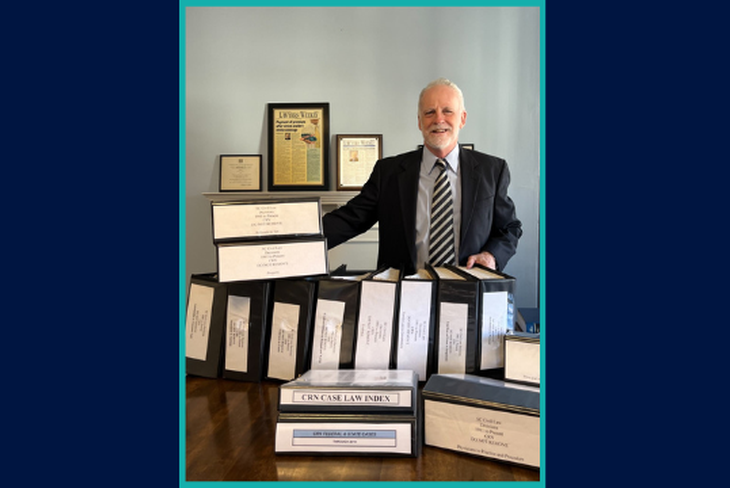Posted in: Lawyers › None

As a young attorney, Charles Norris of Whelan Mellen & Norris, LLC in Charleston, knew he wanted to advance his understanding of civil law.
A graduate of the University of South Carolina School of Law, Norris was inspired during his clerkship with Judge George Coleman when he noticed a notebook with summarized cases Judge Coleman would take to court with him.
In the early years of his career, Norris became increasingly frustrated arguing against more experienced lawyers.
"When I first started practicing law in 1981, everyone was older than me and more experienced than me, which was very frustrating," said Norris. "So, I figured, okay, there's nothing I can do about the experience aspect of it, but I can know the law that came out last week as good or better than him or her."
This frustration led Norris to his books. Fourteen three-ring binders, to be exact, with nearly 5,700 pages of summaries in total and an index that is 58 pages long with approximately 1,500 topics.
"What I do each week when the Advance Sheets come out is I read the cases, assign the holdings in the cases to topics within the books, dictate the holdings and then revise for typos and then pull sheets out of the book, have the dictations printed on the sheets and then put them back in the book," said Norris. "I've summarized every civil law case for over 40 years except for cases that deal with family law, tax law, and criminal law unless cases in those categories have a point of evidence or point of procedure, in which case I will."
Years of practice have made Norris efficient in this task, and what started as a tool to help him advance his knowledge turned into something he enjoyed.
"Once I started it, I couldn't stop," said Norris. "It got to the point where I look forward to the Advance Sheets coming out on Wednesdays. This has been a labor of love as I estimate 90% of the case summaries have nothing to do with my practice. My mother once said I had more useless knowledge in my head than any person she has ever known.”
From meeting with clients, going to court, or writing a brief, Norris's books have served as a valuable resource for him and his colleagues.
"If a client calls up and has a question, I can answer it either A: off the top of my head or B: I can go to my books and get an answer almost immediately," said Norris. "It also helps me spot issues if I'm writing a brief rather than spending hours researching it. The people here at work use the index. I'm very guarded about other people taking books out of my office, but my colleagues use it a good bit."
Norris offered some advice for lawyers breaking into their careers.
"You have to understand your limitations and have humility about it," said Norris. "I'd say about 90% of what I've learned about the law has been after law school, specifically from reading cases. Read cases and stay on top of cases. If you do that and stick to it, it will pay off in the long run. It's just like depositing money in the bank once a week. At first, it doesn't seem like a lot, but eventually, the money accumulates, and it will start paying dividends."
